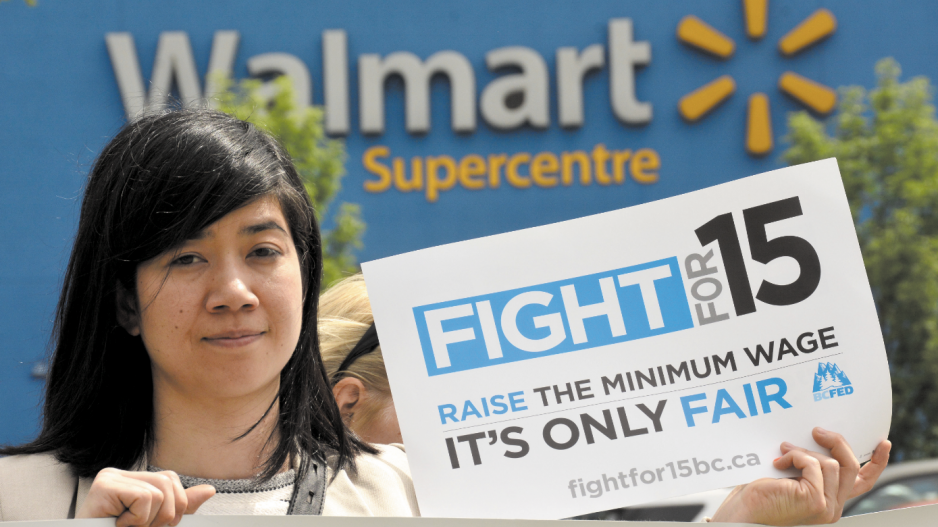A poll released April 1 shows public support for a $15 minimum wage in B.C. is growing, the same day B.C. fell to the bottom of the minimum wage heap compared with other Canadian provinces.
But business groups say the province’s intention to raise the minimum wage by more than the rate of inflation will hurt small businesses, and they’re questioning why the government should be swayed by increases in other provinces.
“Why is that important?” asked Ian Tostenson, CEO of the BC Restaurant & Food Services Association.
Dan Baxter, policy director at the BC Chamber of Commerce, said the province needs “to make decisions for B.C.”
In 2015, the B.C. government announced annual minimum wage increases that would be tied to the rate of inflation. But this year, the province has indicated the increase will be more than inflation because B.C. has had the highest economic growth in the country.
After keeping the hourly minimum wage frozen at $8 between 2001 and 2011, the government gradually increased it to $10.25 by 2012, then implemented the increase tied to inflation in 2015 and raised the wage to $10.45.
The B.C. government will announce a new rate some time this spring, which will go into effect September 15, 2016. Media reports have pegged that increase at $0.30, compared with the expected $0.20 hike.
New Brunswick, previously home to Canada’s lowest legal hourly wage, raised its minimum to $10.65 on April 1, bumping B.C. into last place.
Tostenson and Baxter say an annual increase tied to inflation is the right approach because businesses know what is coming and can budget accordingly. For example, Tostenson said, for a restaurant that brings in $1 million a year and spends $300,000 on labour, an increase to $10.75 would mean increased costs of $6,000.
“That’s a big deal for restaurants,” he said, adding that restaurants face constantly rising costs such as property taxes and food prices, which this year rose sharply.

Tostenson suggested the B.C. government should consider reintroducing the lower training wage or a training tax credit if it increases the minimum wage higher than inflation.
Labour groups and anti-poverty advocates argue the province has fallen behind other jurisdictions with increases that have been too paltry.
A new Insights West poll, commissioned by the BC Federation of Labour, found that 76% of British Columbians support increasing the minimum wage to $15 an hour, compared with 68% in 2015.
Moving to $15 an hour doesn’t have to happen overnight, said federation president Irene Lanzinger. Seattle is increasing its minimum wage by $0.50 a year and will reach $15 by 2021. California’s state legislature recently reached a deal to raise its minimum wage to $15 by 2022, with annual increases between $0.50 and $1 depending on the year. In that state, 43% of workers make less than $15 an hour, compared to 27% in B.C.
Alberta is standing firm on its commitment to increase its minimum wage to $15 by 2018, although Alberta Premier Rachel Notley has said the pace of the increase could be slowed by the state of the province’s economy.
Meanwhile, at the current rate of increase, B.C. won’t have a $15 minimum wage until 2034, Lanzinger said.
Few people in British Columbia make minimum wage, and that number is falling, Baxter said, in partial justification for keeping the increase modest. In 2014, the number of B.C. workers being paid minimum wage was 110,400, or 5.9% of the workforce. In 2015, a total of 93,000 B.C. workers made minimum wage, or 4.9% of the workforce. (Around half of the minimum wage earners in B.C. are young people who live with their parents.)
But history shows that the number of people making minimum wage dropped the longer B.C.’s wage remained unchanged, indicating it has at times not reflected prevailing wage rates.

Between 2001 and 2011, the minimum wage was frozen at $8 an hour; in 2011 it rose to $9.50 and in 2012 to $10.25, where it stayed until the B.C. government increased it to $10.45 in 2015. Data source: BC Stats
Raising minimum wage helps increase pay rates elsewhere in the low-wage spectrum. That’s a concern for businesses because it drives up labour costs across the board. But to $15 campaigners, it’s a positive outcome.
“We all agree that businesses do need time to adjust, but we think the government should commit to phasing in a wage that is above the poverty line,” Lanzinger said. “$15 an hour is about 10% above the poverty line.”
@jenstden




